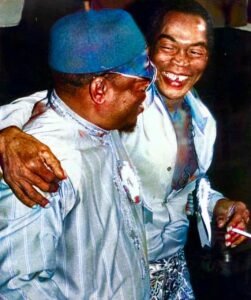DEK: From Kaduna to Lagos, the veteran Afrobeats artist reflects on his decade-long journey, blending genres, and why his latest track Jogo is more than just a throwback—it’s an upgrade.
DEK: From Kaduna to Lagos, the veteran Afrobeats artist reflects on his decade-long journey, blending genres, and why his latest track Jogo is more than just a throwback—it’s an upgrade.
There’s a refreshing energy in Skales’ voice when he talks about his latest single, Jogo. For the Afrobeats pioneer, the song isn’t just a nostalgic nod to the 2010s when he first started making waves—it’s a reflection of growth, innovation, and a return to his roots, but with an edge. “I wouldn’t call it a throwback,” he says. “This is a re-up, an upgrade. No one’s really doing this right now, blending samples with the real, traditional Afro sounds. This is me going back to the basics, but with everything I’ve learned along the way.”
It’s been over a decade since Skales burst onto the scene, and in that time, Afrobeats has exploded into a global movement. While the genre continues to evolve, the Nigerian artist remains firmly rooted in the sounds and stories that made him. His journey—from the bustling streets of Lagos to the serene culture of Northern Nigeria—finds a new expression in Jogo, a track that’s rich in cultural heritage and a reminder that home is where the heart of Afrobeats truly lies.
For Skales, this project is personal. “If I’m talking about using traditional sounds, what better way to translate it visually than going to the roots?” he says, discussing the Jogo video, which features scenes shot across Nigeria—from Lagos to Kano. “Our culture is our identity—it’s what makes us who we are, and it’s time we go back to it.”
But as the world continues to groove to the infectious rhythms of Afrobeats, Skales is clear about one thing: his place in the movement is solid. “I’m one of the pioneers of this Afrobeat-to-the-world movement,” he says. “It’s not just about staying relevant—it’s about setting trends.”
In a candid conversation with Rolling Stone Africa, Skales opens up about his creative process, the importance of cultural representation in his work, and why the new wave of Afrobeats is only just getting started.
Rolling Stone Africa: Your new single “Jogo” has been described as a throwback to your early sound from the 2010s. What inspired you to tap into that vibe again?
Skales: I wouldn’t call it a throwback, to be honest. It’s more like a re-up. I’m levelling up on what I did back then, upgrading it with what I’ve learned along the way. Nobody’s really making music like this right now—the samples, the traditional sounds—it’s pure Afrobeats. So, I went back to the basics, but with more confidence, more knowledge. You can hear it in the lyrics, the melodies, everything. This isn’t nostalgia—it’s growth.
RSA: The video for “Jogo” is a rich visual representation of Nigerian culture. How did you and Stanz Visual approach the concept?
Skales: The video was all about culture. We shot in Badagry, Makoko, Kano, and Abuja, hitting spots that represent different parts of Nigeria. The goal was to remind people where we come from, to show that our identity is in our roots. A lot of times, we get caught up in Western trends, but our culture is our power. That’s the message—we should be proud of our heritage and push it out to the world.
RSA: Afrobeats has exploded globally, and you’ve been part of that journey for over a decade. How do you stay relevant in such a fast-moving industry?
Skales: Man, I’m blessed to have been part of this movement. I’ve stayed relevant by constantly adapting. You’ve got to evolve with the sound, but also keep what makes you, you. I’ve worked with artists all over the world—from Burna Boy to Major Lazer—and every collaboration brings something new to my music. Travelling, learning new things, and experimenting with sounds—that’s what keeps me going.
RSA: You blend genres like hip-hop, house, and soul into your music. What’s your process like when experimenting with these different styles?
Skales: It’s all about good vibes, man. I’m big on melody, so if the chords hit right, I’m inspired. I love blending hip-hop, house, and soul with Afropop because those genres shaped me. They give the music a different energy—whether it’s making you dance or feel something deeper. I don’t overthink it. If it feels good, I roll with it.
Pull Quote 1: “Our culture is our identity. It’s time we go back to it and show the world what we’re made of.”
RSA: “Jogo” has been called a call to joy amidst the chaos of life. How do you cope with the pressures in your own life, and how does that come through in your music?
Skales: Music is my therapy, man. When I’m going through something, it’s the only thing that gets me out of my head. I made “Jogo” to bring joy to people, because I know life’s hard out here. We’re all feeling the pressure, but music lets you escape for a while. That’s how I cope—by making something that reminds people, including myself, to find happiness, even when everything’s a mess.
RSA: You’ve spent time in both Northern Nigeria and Lagos—two very different cultural environments. How does that influence your sound?
Skales: The North taught me to go deep with the music, to focus on the message. Lagos, on the other hand, is all about the vibe—if your song doesn’t make people move, it’s not a hit. So, I’ve learned to balance both. I can pass a message and still make you dance. Songs like “Shake Body” are perfect examples—I was telling my story, but you could still turn up to it.
RSA: Your early years with Empire Mates Entertainment were foundational. How did that shape your approach to music and the industry?
RSA: Your early years with Empire Mates Entertainment were foundational. How did that shape your approach to music and the industry?
Skales: Joining EME was a crash course in the music business. I came from a slower-paced environment in the North, so moving to Lagos was a whole new world. Banky W, Wizkid—they were killing it, and just being around them taught me how to work smarter and faster. I learned that you need a solid team, and you need to plan. Now, I can record a hit in 30 minutes. That grind I learned back then still pushes me today.
RSA: Your 2020 album Healing Process felt very introspective. How did the pandemic change your music?
Skales: The pandemic made me bolder. Healing Process came from a real place of pain—I’d just gone through a breakup, and the world was in chaos. That was a turning point for me, both personally and musically. I started experimenting more, and I gained confidence in my sound. Right now, I’m diving into sampling, like with “Jogo.” I’m not holding back—I’m pushing myself to new places.
RSA: Collaboration has been key to your career. What are some of your favourite collabs, and how have they shaped your sound?
Skales: Working with Burna Boy was a big one—he’s one of my favourite artists. That collab came easy because we have a vibe. Davido, Nicki Minaj, Major Lazer—they all brought something different to the table. Collaborating has opened my mind to new sounds and ways of thinking. It’s definitely helped me grow as an artist.
Pull Quote 2: “I’m honored to be part of this Afrobeats-to-the-world movement. It’s not just about staying relevant—it’s about setting trends.”
RSA: Afrobeats has gone from local to global, and you’ve been there since the beginning. What do you see for the future of the genre?
Skales: We’ve only just scratched the surface, man. Nigeria alone has so many tribes, so many different sounds—we’ve got a lot more to show the world. I’m proud to have been part of this movement from the start, and I’m still pushing boundaries. There’s so much more coming, and I plan to stay right in the middle of it, setting trends and helping the next generation take Afrobeats even further.
RSA: Longevity in the music industry is tough. What’s been the key to your sustained success?
Skales: Honestly, it’s about adapting. The game changes fast, and you’ve got to roll with it. You can’t be stuck in one sound or mindset. Working with new artists, embracing new trends, and constantly evolving—that’s how you stay relevant. I just keep learning and pushing myself.
RSA: What message do you want people to take from “Jogo,” and what impact do you hope it has?
Skales: I want people to feel good, to be happy. At the end of the day, that’s what it’s all about—spreading joy and kindness. With “Jogo,” I’m pushing people to celebrate themselves, to dance, to be proud of where they come from. Culturally, I hope it reminds people of the beauty in our roots.




